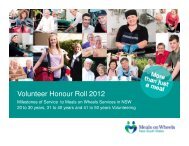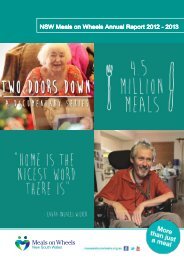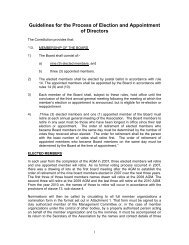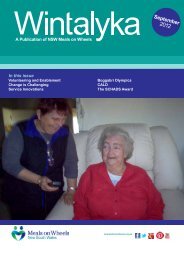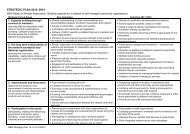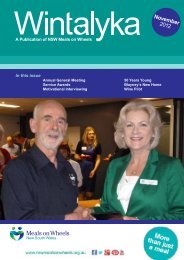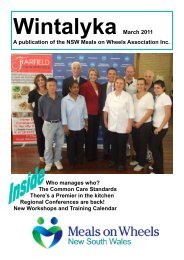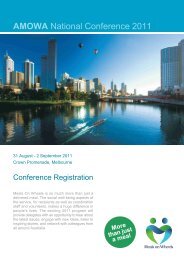Issue
Wintalyka August 2011 - Meals on Wheels
Wintalyka August 2011 - Meals on Wheels
Create successful ePaper yourself
Turn your PDF publications into a flip-book with our unique Google optimized e-Paper software.
Wintalyka <strong>Issue</strong> 01 / 2011<br />
HCC FF Training Day<br />
Hunter Central Coast<br />
Future Food Flexible<br />
Food Pilot Training<br />
Day<br />
Tim McGovern<br />
On 14 July 2011 a training session<br />
was convened by the Future Food<br />
management team for Newcastle MOW<br />
Inc., Morisset/Toronto MOWS, and<br />
Central Coast MOW & Beresfield and<br />
District Community Care Inc Flexible<br />
Food Pilot staff.<br />
Other interested Food Services staff and<br />
volunteers were also invited to participate.<br />
There is significant interest across NSW and<br />
other states regarding the Flexible Food model.<br />
This article gives a brief outline of the content<br />
delivered on the training day.<br />
Flexible Food Model<br />
Sue Atkins gave an outline of the Flexible Food<br />
model. It determines the clients’ food needs<br />
and social support needs together and looks for<br />
ways to try to meet these needs by matching the<br />
service to client needs. This model combines<br />
social and nutritional needs together whilst<br />
focusing on the ability of the person receiving<br />
the service to enhance their independence by<br />
setting specific achievable time specific goals.<br />
Individual assessment is integral to the<br />
program. A detailed narrative approach to<br />
discussion takes place with the client taking a<br />
holistic and individual approach to nutritional<br />
and community needs. The narrative approach<br />
will be presented by Viv Read.<br />
Flexible food is considered an early<br />
intervention program or has a rehabilitation<br />
focus from a client goal driven and goal focused<br />
approach. It applies Enabling, Wellness and<br />
Restorative Care principles. All HACC eligible<br />
clients may participate and it is well suited<br />
to younger people with a disability. This<br />
assessment determines if there is a need to refer<br />
to a dietitian. A discussion takes place about<br />
eating habits, impacting factors (i.e. recent<br />
bereavement) the ability to cook and shop and<br />
the availability of equipment (e.g. microwave).<br />
A client with a specialised diet should have an<br />
assessment and a suggested eating plan made<br />
by a Dietitian. This plan can be incorporated<br />
into the client service activities. Some client<br />
goals may be linked to nutrition e.g. loss or gain<br />
weight, prepare gluten free foods.<br />
The level of available support needs to be<br />
determined: whether the client has family in<br />
the area; will these family members be a part of<br />
the care plan; other services that may provide<br />
a part of the plan e.g. shopping. Client goals<br />
around community access may be assisted<br />
by family or if this is not available, the help<br />
of volunteers. It may be helpful to look to<br />
community groups for activities which include<br />
a food component such as craft groups or bus<br />
trips with lunches.<br />
Is the client receiving services from another<br />
organisation? If so, don’t duplicate this service<br />
but make use of it. Work with other services<br />
to enhance individual social and nutritional<br />
support. The assessment process needs to<br />
determine if current service levels are enough<br />
to meet the nutritional and social needs of<br />
the client. Existing services may need to be<br />
enhanced e.g. shopping by Neighbour Aid with<br />
in home food preparation by Flexible Food<br />
volunteers.<br />
Rather than recreating what exists in the<br />
local community, partner with HACC Centre<br />
Based Day Care Centres and Neighbour Aid<br />
who already provide meals in a social setting.<br />
It is important to scope the whole local area to<br />
understand all organisations that have social/<br />
meal events including RSL’s, Legacy and many<br />
other organisations.<br />
Availability refers to the type of food the client<br />
requires. A diet specific meal may be required<br />
e.g. vegetarian, halal or kosher. Is the type of<br />
food the client is seeking available? If not, is<br />
there a way of sourcing preprepared meals<br />
for them? This may include diet or culturally<br />
specific meals.<br />
www.nswmealsonwheels.org.au 27



